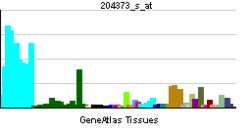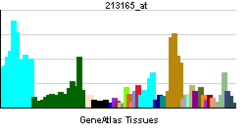CEP350
Centrosome-associated protein 350 is a protein that in humans is encoded by the CEP350 gene.[3][4][5]
CEP350 is a large protein with a CAP-Gly domain typically found in cytoskeleton-associated proteins. It primarily localizes to the centrosome, a non-membraneous organelle that functions as the major microtubule-organizing center in animal cells. CEP350 is required to anchor microtubules at the centrosome. Furthermore, it increases the stability of growing centrioles.[6]
It is also implicated in the regulation of a class of nuclear hormone receptors in the nucleus. Several alternatively spliced transcript variants have been found, but their full-length nature has not been determined.[5]
References
Further reading
- Andersson B, Wentland MA, Ricafrente JY, et al. (1996). "A "double adaptor" method for improved shotgun library construction". Anal. Biochem. 236 (1): 107–13. doi:10.1006/abio.1996.0138. PMID 8619474.
- Bonaldo MF, Lennon G, Soares MB (1997). "Normalization and subtraction: two approaches to facilitate gene discovery". Genome Res. 6 (9): 791–806. doi:10.1101/gr.6.9.791. PMID 8889548.
- Yu W, Andersson B, Worley KC, et al. (1997). "Large-Scale Concatenation cDNA Sequencing". Genome Res. 7 (4): 353–8. doi:10.1101/gr.7.4.353. PMC 139146
 . PMID 9110174.
. PMID 9110174.
- Seki N, Ohira M, Nagase T, et al. (1998). "Characterization of cDNA clones in size-fractionated cDNA libraries from human brain". DNA Res. 4 (5): 345–9. doi:10.1093/dnares/4.5.345. PMID 9455484.
- Makalowska I, Sood R, Faruque MU, et al. (2002). "Identification of six novel genes by experimental validation of GeneMachine predicted genes". Gene. 284 (1–2): 203–13. doi:10.1016/S0378-1119(01)00897-6. PMID 11891061.
- Strausberg RL, Feingold EA, Grouse LH, et al. (2003). "Generation and initial analysis of more than 15,000 full-length human and mouse cDNA sequences". Proc. Natl. Acad. Sci. U.S.A. 99 (26): 16899–903. doi:10.1073/pnas.242603899. PMC 139241
 . PMID 12477932.
. PMID 12477932.
- Andersen JS, Wilkinson CJ, Mayor T, et al. (2003). "Proteomic characterization of the human centrosome by protein correlation profiling". Nature. 426 (6966): 570–4. doi:10.1038/nature02166. PMID 14654843.
- Ota T, Suzuki Y, Nishikawa T, et al. (2004). "Complete sequencing and characterization of 21,243 full-length human cDNAs". Nat. Genet. 36 (1): 40–5. doi:10.1038/ng1285. PMID 14702039.
- Oh JH, Yang JO, Hahn Y, et al. (2006). "Transcriptome analysis of human gastric cancer". Mamm. Genome. 16 (12): 942–54. doi:10.1007/s00335-005-0075-2. PMID 16341674.
- Kimura K, Wakamatsu A, Suzuki Y, et al. (2006). "Diversification of transcriptional modulation: Large-scale identification and characterization of putative alternative promoters of human genes". Genome Res. 16 (1): 55–65. doi:10.1101/gr.4039406. PMC 1356129
 . PMID 16344560.
. PMID 16344560.
- Nousiainen M, Silljé HH, Sauer G, et al. (2006). "Phosphoproteome analysis of the human mitotic spindle". Proc. Natl. Acad. Sci. U.S.A. 103 (14): 5391–6. doi:10.1073/pnas.0507066103. PMC 1459365
 . PMID 16565220.
. PMID 16565220.
- Gregory SG, Barlow KF, McLay KE, et al. (2006). "The DNA sequence and biological annotation of human chromosome 1". Nature. 441 (7091): 315–21. doi:10.1038/nature04727. PMID 16710414.
- Lim J, Hao T, Shaw C, et al. (2006). "A protein-protein interaction network for human inherited ataxias and disorders of Purkinje cell degeneration". Cell. 125 (4): 801–14. doi:10.1016/j.cell.2006.03.032. PMID 16713569.
- Olsen JV, Blagoev B, Gnad F, et al. (2006). "Global, in vivo, and site-specific phosphorylation dynamics in signaling networks". Cell. 127 (3): 635–48. doi:10.1016/j.cell.2006.09.026. PMID 17081983.
- Hoppeler-Lebel A, Celati C, Bellett G, et al. (2007). "Centrosomal CAP350 protein stabilises microtubules associated with the Golgi complex". J. Cell. Sci. 120 (Pt 18): 3299–308. doi:10.1242/jcs.013102. PMID 17878239.
PDB gallery |
|---|
|
| 2coz: Solution structure of the CAP-Gly domain in human centrosome-associated protein CAP350 |
|
|




 . PMID 16314388.
. PMID 16314388. . PMID 19052644.
. PMID 19052644. . PMID 9110174.
. PMID 9110174. . PMID 12477932.
. PMID 12477932. . PMID 16344560.
. PMID 16344560. . PMID 16565220.
. PMID 16565220.